Bitcoin (BTC) has been trading between $25,333 and $26,156 since Sep. 1. Typically, a volatility squeeze is followed by an expansion in volatility but it is difficult to predict the direction of the breakout with certainty.
CoinGlass data shows that Bitcoin has fallen for six consecutive years in September. This historic data could keep the bulls at bay in the near term and embolden the bears. Additionally, the United States dollar index (DXY) which has an inverse correlation with Bitcoin has risen sharply in the past few weeks. Both these suggest that Bitcoin could remain under pressure in the short term.
It is not all gloom and doom for the crypto bulls because lower levels are likely to attract buyers. The prospect of one or more Bitcoin spot exchange-traded fund applications receiving approvals may limit the downside. Several analysts believe this event to be hugely bullish for Bitcoin. Any positive news in this regard may prop prices higher.
From a macro perspective, it looks like there may be near-term weakness but lower levels are likely to be purchased. What are the important support levels to watch out for? Let’s study the charts of the top-10 cryptocurrencies to find out.
Bitcoin price analysis
Bitcoin has been trading below $26,000 for the past two days and the bears are trying to tug the price toward the vital support at $24,800.
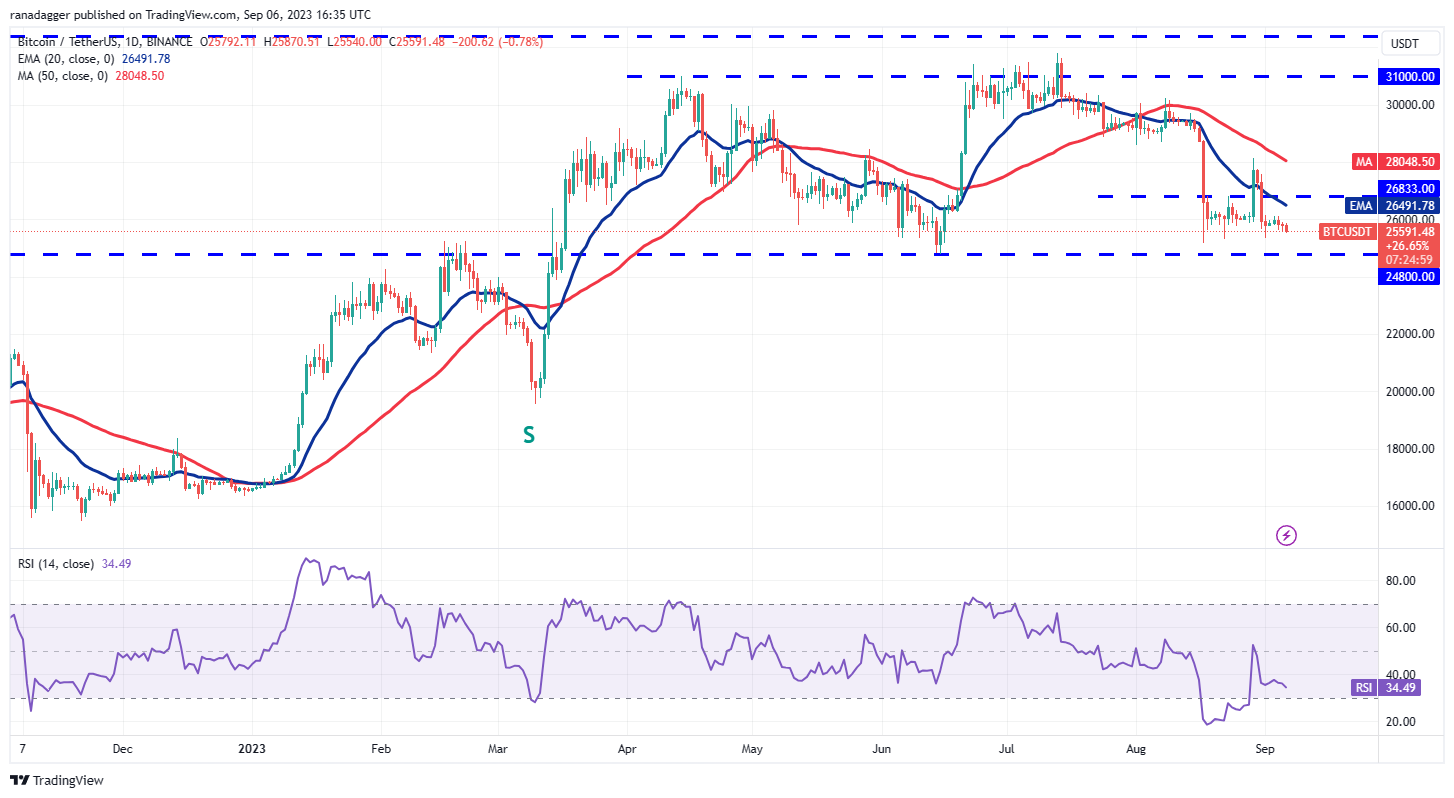
The downsloping moving averages indicate advantage to sellers but the developing positive divergence on the relative strength index (RSI) suggests that the bearish momentum could be weakening.
Buyers will have to drive and sustain the price above $26,833 to start a relief rally to the 50-day simple moving average ($28,048). Such a move will suggest that the price may remain stuck inside the large range between $24,800 and $31,000.
Meanwhile, the bears are likely to have other plans. They will try to sink the price below the $24,800-$24,000 support zone. If they manage to do that, the selling could accelerate and the BTC/USDT pair may plunge to $20,000.
Ether price analysis
The long tail on Ether’s (ETH) Sep. 4 and 5 candlestick shows that the bulls are buying the dips below the immediate support at $1,626. However, there is no follow-up buying at higher levels.
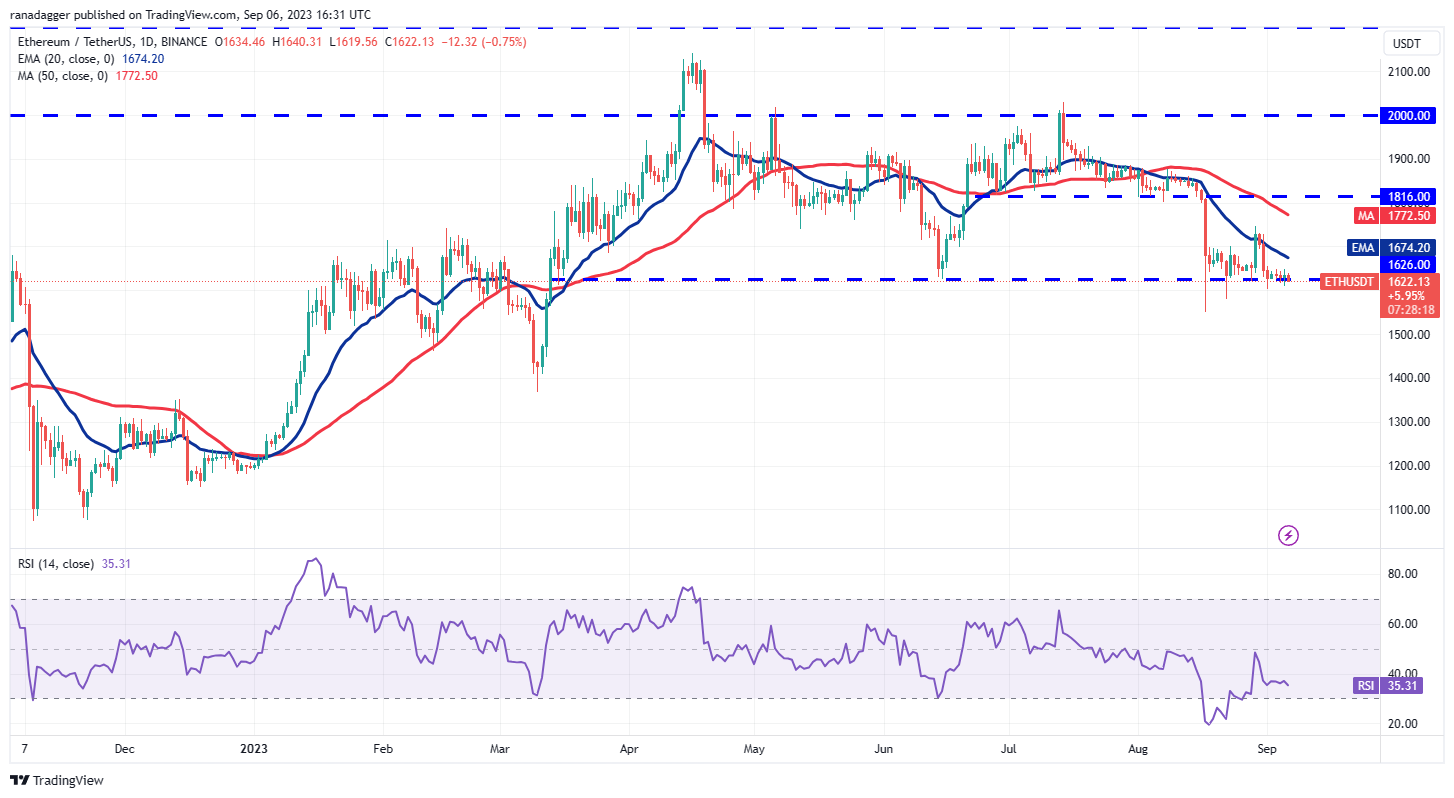
This means that the bears are selling on rallies near $1,650. This narrow-range trading is unlikely to continue for long. If the price plummets and maintains below $1,600, it will indicate that bears have seized control. There is a minor support at $1,550 but if it crumbles, the ETH/USDT pair could nosedive to $1,368.
On the upside, the bears are expected to fiercely defend the zone between $1,650 and the 20-day exponential moving average ($1,674). If buyers overcome this barrier, the pair could soar to the 50-day SMA ($1,772).
BNB price analysis
BNB (BNB) has been trading below the important level of $220 for the past few days but the bears have failed to capitalize on this opportunity.
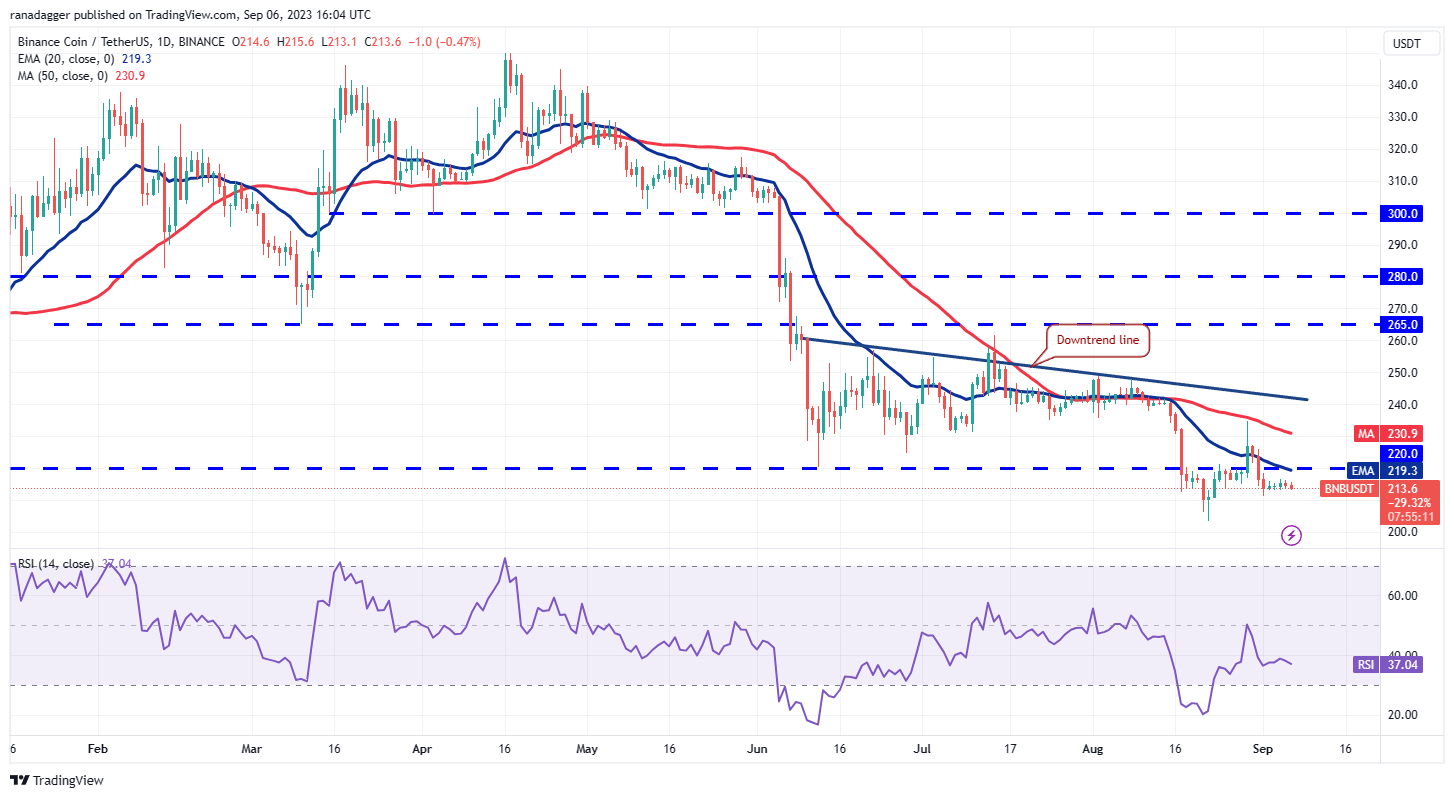
This suggests that selling dries up at lower levels. That could keep the BNB/USDT pair stuck between $220 and $200 for some time. A tight consolidation below the breakdown level increases the possibility of a further slide. If the $200 support cracks, the pair could resume its downtrend. The next major support on the downside is $183.
If buyers want to launch a comeback, they will have to kick the price above $220. That will indicate solid buying at lower levels. The pair may then attempt a rally to the downtrend line.
XRP price analysis
XRP (XRP) has been clinging to the $0.50 support for the past few days. The failure to start a strong rebound off it increases the likelihood of a downside breakdown.
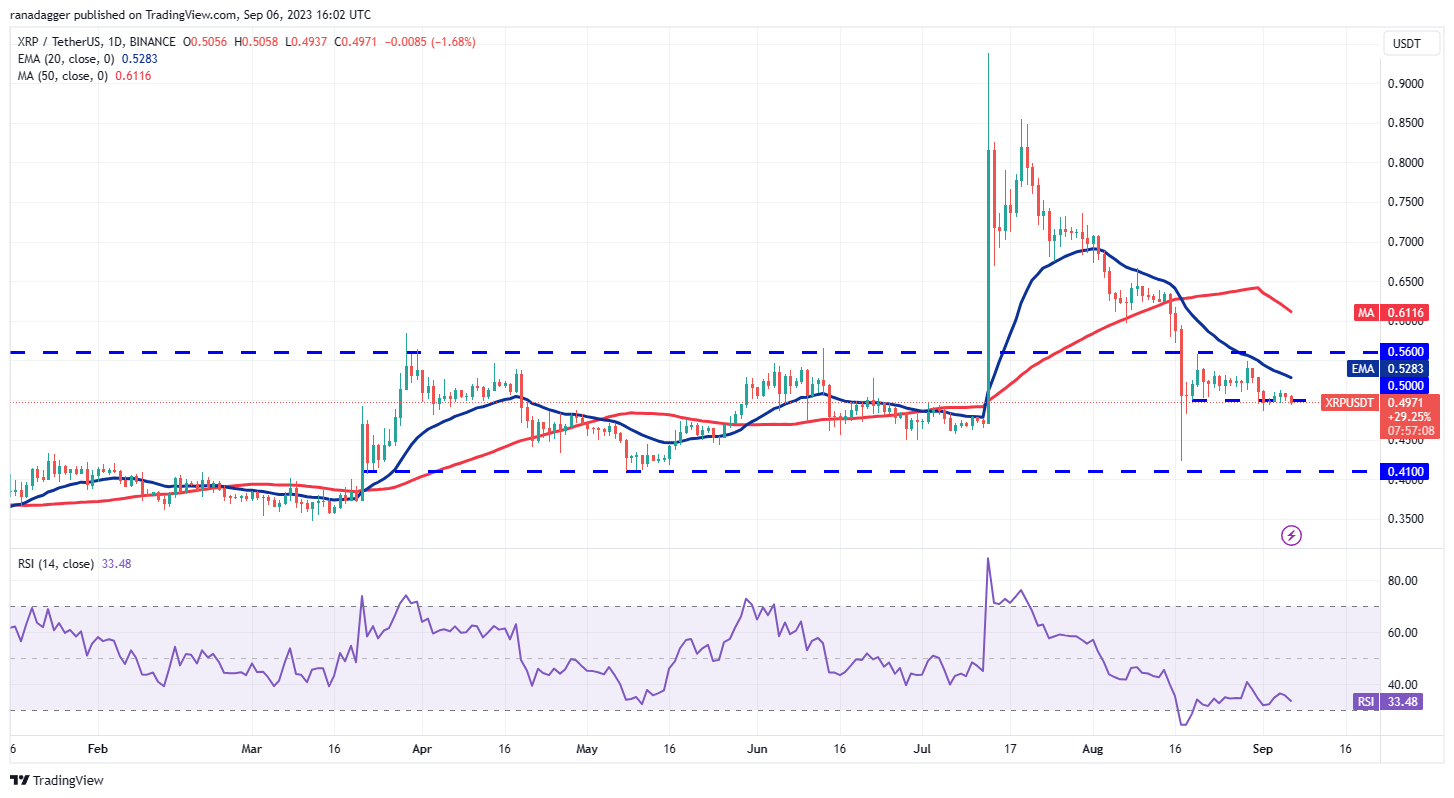
A break and close below $0.50 will indicate that the XRP/USDT pair may extend its stay inside the $0.56 to $0.41 range for a few more days. There is no major support between $0.50 and $0.41, hence the fall may be swift.
Another possibility is that the price turns up from the current level and rises above the 20-day EMA ($0.52). If that happens, the pair may climb to $0.56 which is an important level to keep an eye on.
Cardano price analysis
Cardano (ADA) has been trading inside a tight range for the past few days. This suggests that the bulls and the bears are playing it safe and not waging large bets.
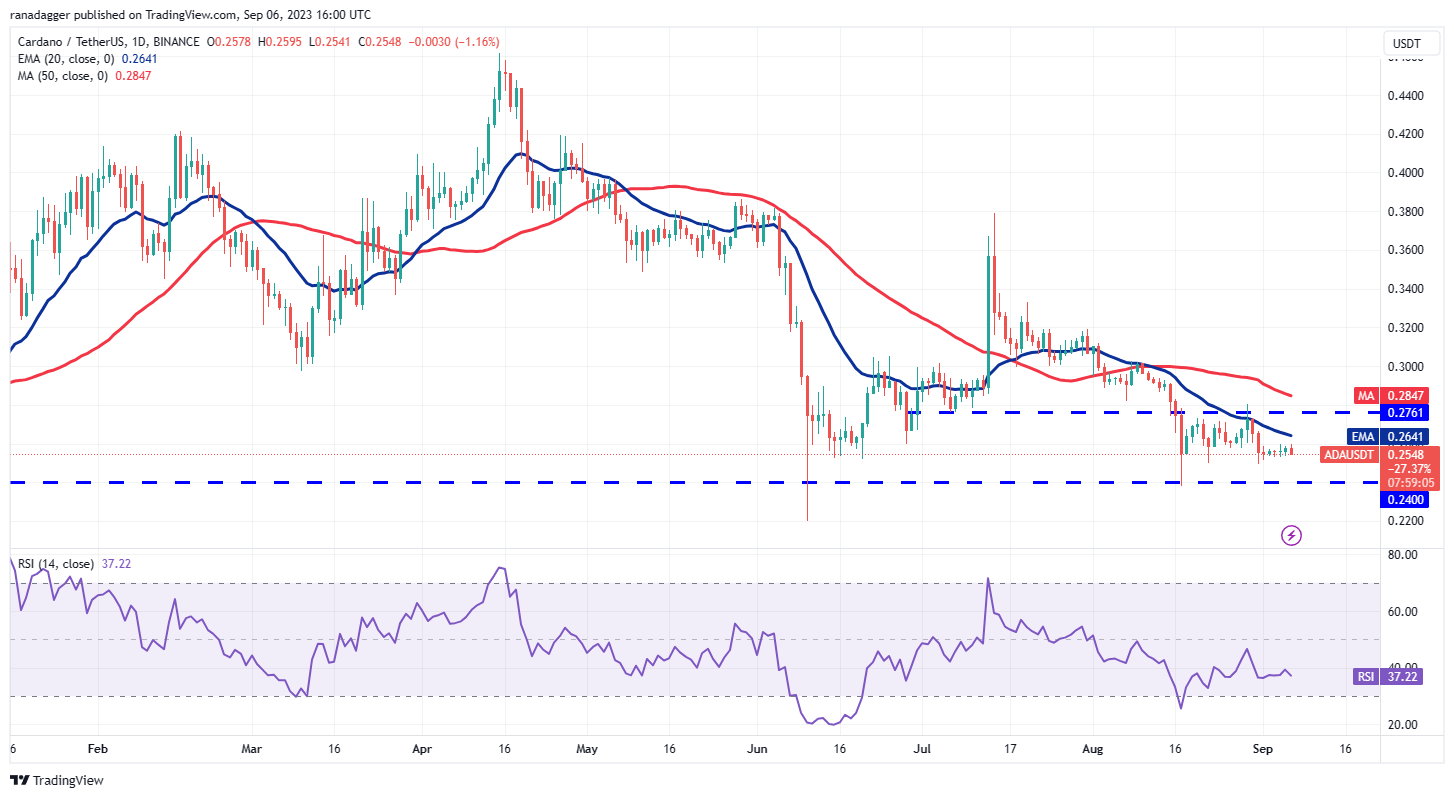
The downsloping moving averages and the RSI in the negative territory indicate that bears have a slight edge. If the price breaks below $0.25, the bears will try to sink the ADA/USDT pair to $0.24.
Contrarily, a break and close above the 20-day EMA ($0.26) will be the first sign of strength. That will pave the way for a rally to the 50-day SMA ($0.28). Buyers will have to clear this hurdle to start a sustained recovery.
Dogecoin price analysis
Dogecoin (DOGE) reached the 20-day EMA ($0.06) on Sep. 6, indicating that the bulls are attempting to start a relief rally.
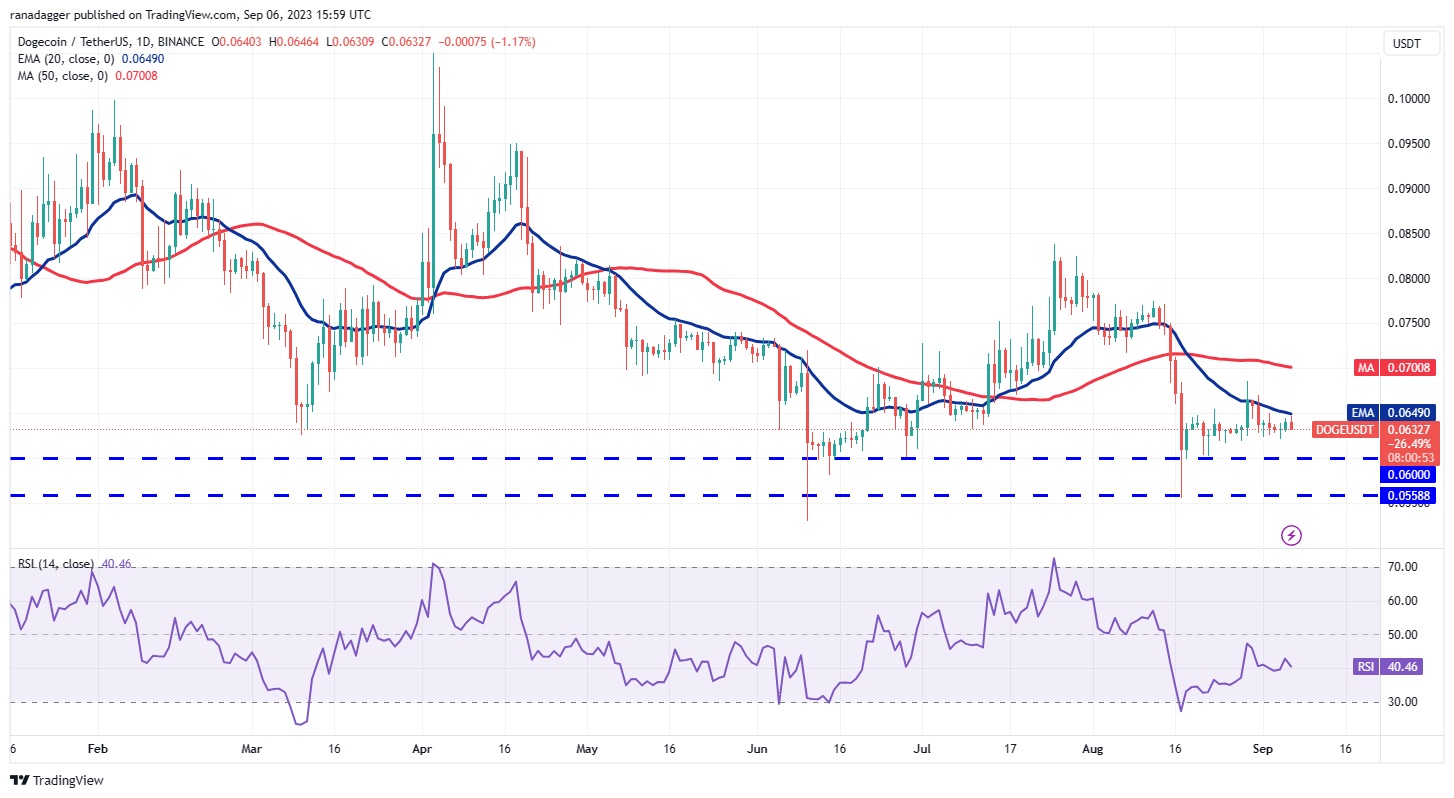
However, the bears are unlikely to give up easily and will mount a strong defense at the 20-day EMA. If the price turns down sharply, the bears will try to strengthen their position by pulling the DOGE/USDT pair below $0.06. If they succeed, the pair may extend its decline to the next support at $0.055.
On the upside, a break and close above the 20-day EMA will be the first sign that the selling pressure is reducing. That may start a rally to the 50-day SMA ($0.07) and later to $0.08.
Solana price analysis
Solana’s (SOL) recovery attempt is facing strong selling at the downtrend line. This indicates that the bears are defending this level aggressively.
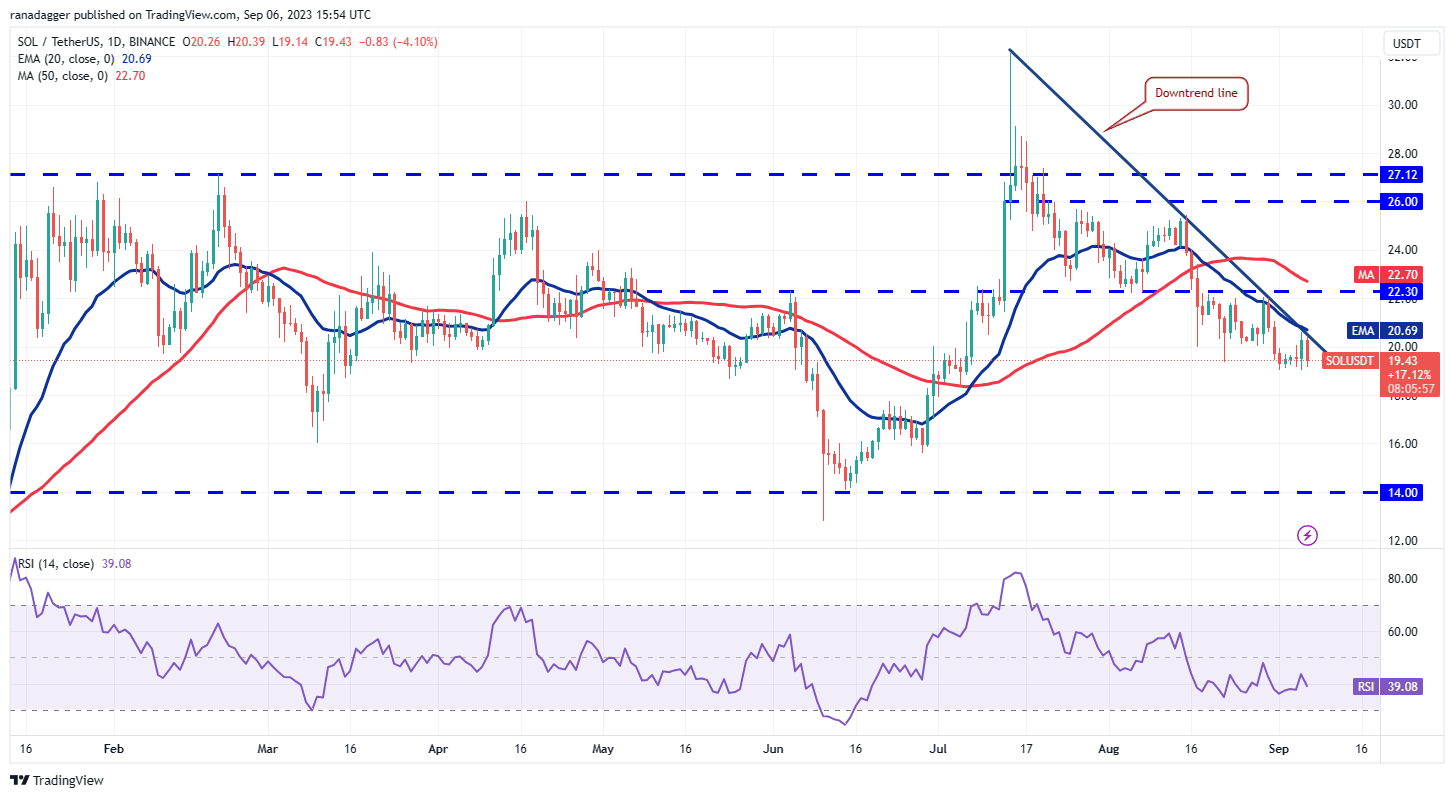
If the price skids below $19, the SOL/USDT pair could resume its downtrend. The first support on the downside is $18 and the next is $16. Buyers are expected to defend this level with vigor.
The first indication of strength will be a break and close above the 20-day EMA ($20.69). That could start a stronger recovery to the 50-day SMA ($22.70). This level may again act as a roadblock but if bulls clear it, the pair could attempt a rally to $25.42.
Related: Here’s why Bitcoin will hit $22K soon
Toncoin price analysis
The sharp rise in Toncoin (TON) pushed the RSI into the overbought territory indicating that the rally had run up ahead of itself. That typically leads to a correction or consolidation and that is what happened.
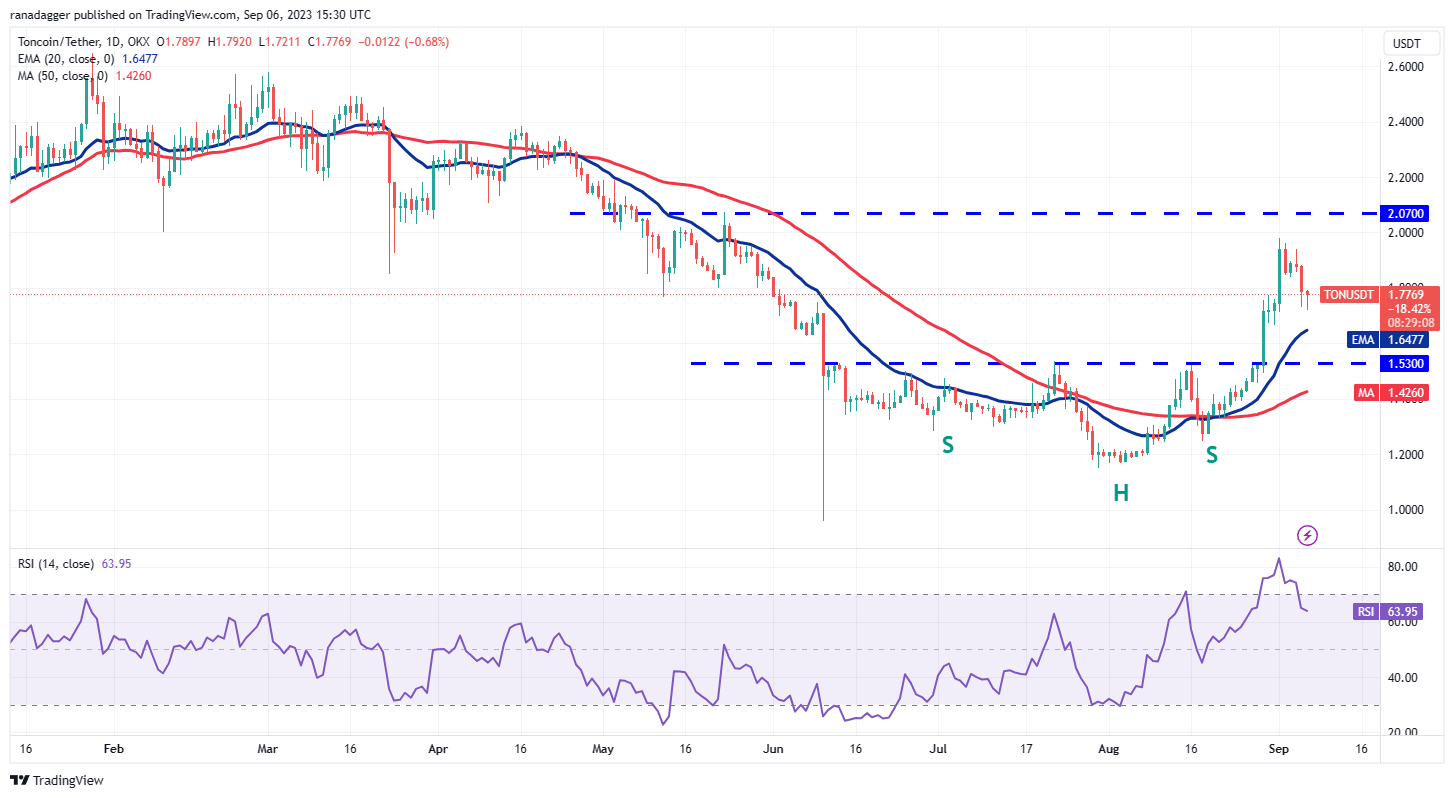
Profit-booking by the bears has pulled the price toward the 20-day EMA ($1.64). This remains the key support to watch out for. If the price rebounds off the 20-day EMA, it will suggest that the sentiment remains positive and traders are buying on dips. That could propel the price to $2.07. If this level gives way, the rally could stretch to $2.38.
Alternatively, if the 20-day EMA cracks, it will suggest that the bulls are losing their grip. The TON/USDT pair may then slump to $1.53 and later to the 50-day SMA ($1.42).
Polkadot price analysis
Buyers are struggling to start a strong rebound in Polkadot (DOT), indicating that the bears have kept up the pressure.
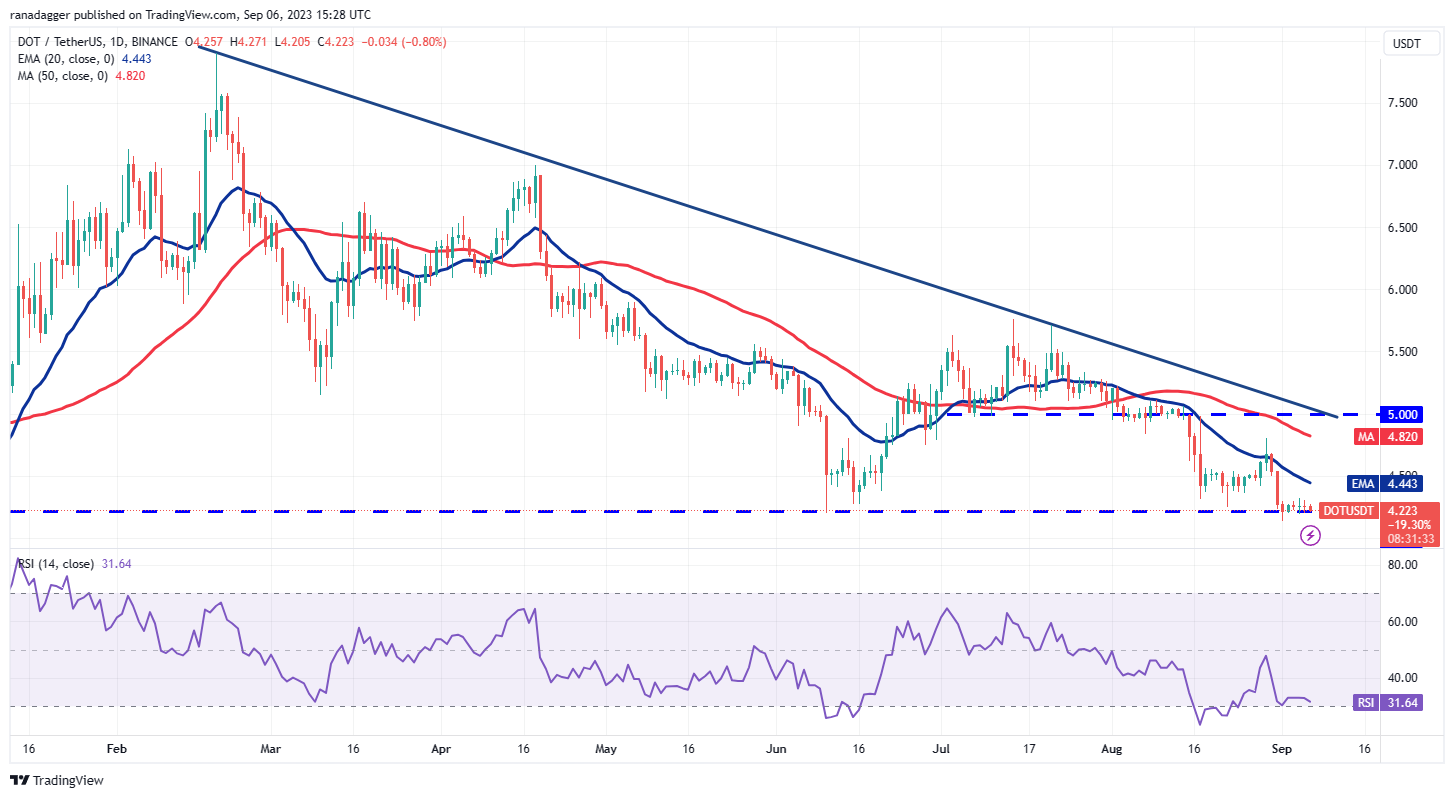
The downsloping moving averages and the RSI near the oversold zone increase the likelihood of a downward breakdown. If the $4.22 level gives way, the DOT/USDT pair could skid to the next major support at $4.
Contrary to this assumption, if the price turns up from the current level, the bears will try to halt the recovery at the 20-day EMA ($4.44) and again at the downtrend line. Buyers will have to clear this barrier to indicate a potential trend change.
Polygon price analysis
Polygon (MATIC) reached the 20-day EMA ($0.57) on Sep. 5 but the bulls could not clear this hurdle. This suggests that demand dries up at higher levels.
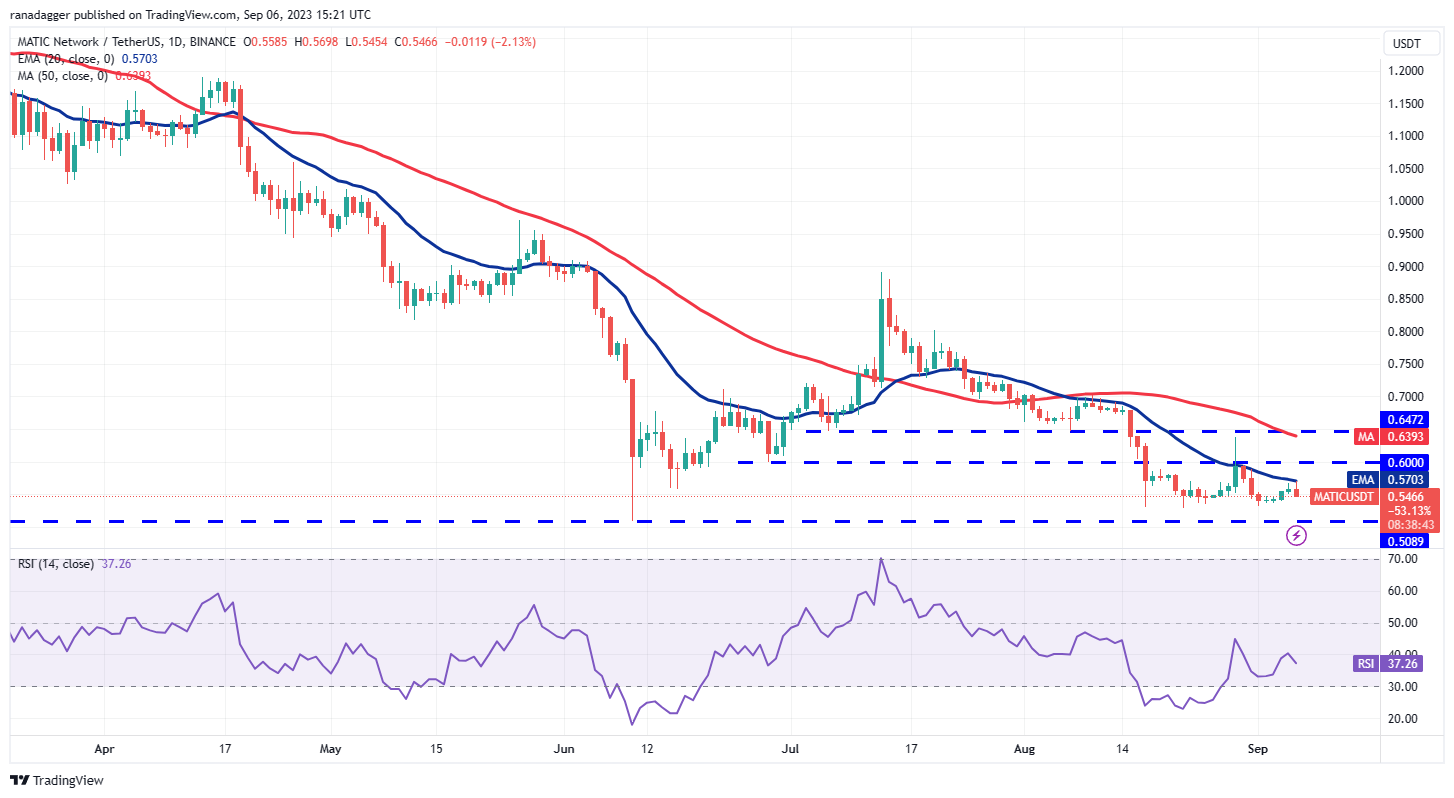
The bears will try to sink the price to the crucial support at $0.50. This remains the key level to watch out for in the near term because a break below it will resume the downtrend. The MATIC/USDT pair then risks a further slide to $0.45.
If bulls want to prevent the downside, they will have to quickly push the price above the 20-day EMA. That could start a stronger recovery to the overhead resistance at $0.60 and then $0.64. This level is again likely to witness solid selling by the bears.
This article does not contain investment advice or recommendations. Every investment and trading move involves risk, and readers should conduct their own research when making a decision.
Read the full article here

